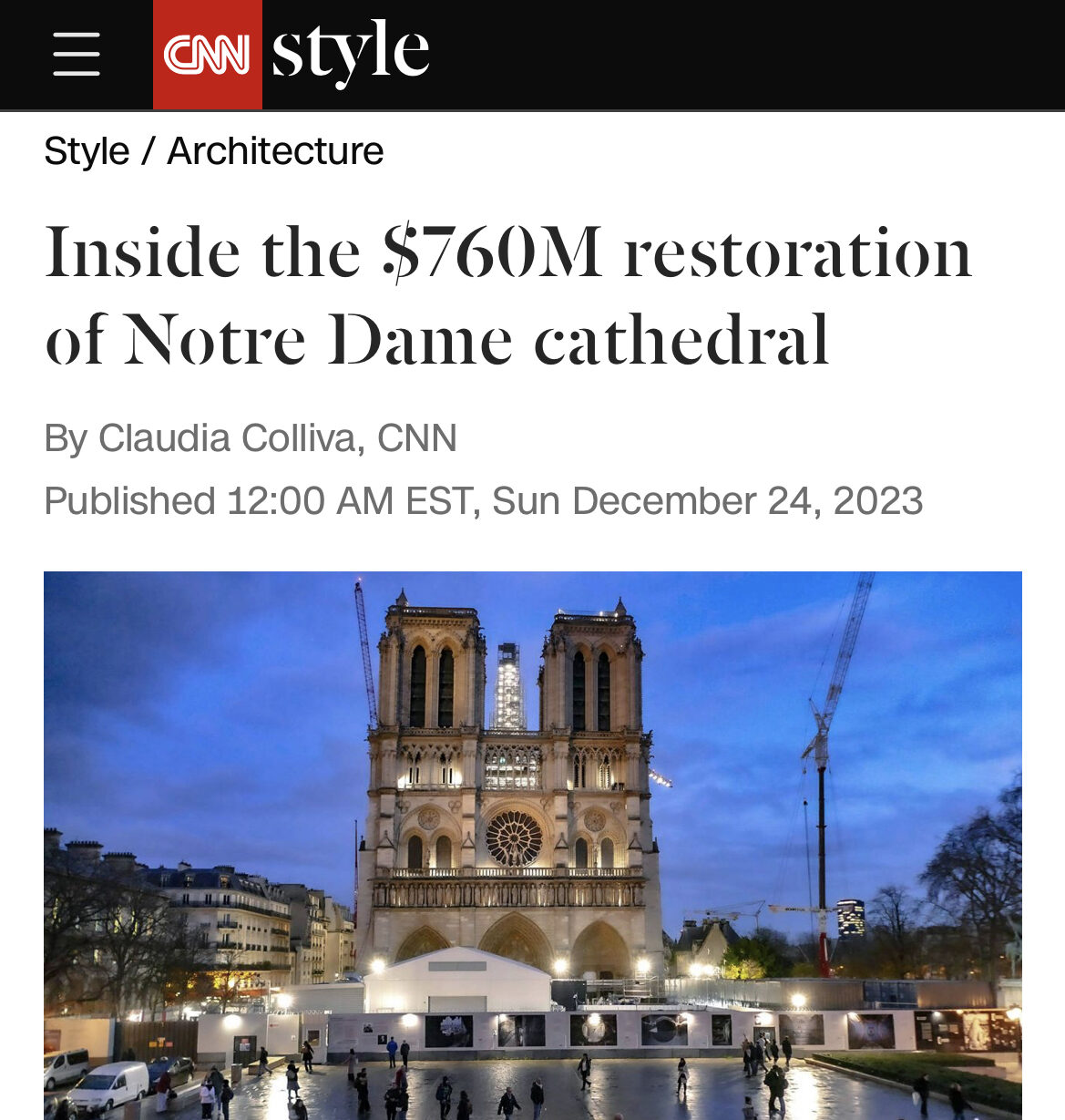Available at CNN.com
The spire of Notre Dame, crowned by a brand new golden rooster, regained its place in the Paris skyline last week.
As tourists and Parisians gathered outside the UNESCO-listed cathedral to admire the return of one of its most emblematic features — for now, still encased in scaffolding — the Notre Dame worksite remained in full swing. Nearly 500 craftspeople are busy with rebuilding efforts, working to ensure the Parisian landmark is ready for its grand reopening to the public less than a year from now.
“It’s fascinating to see how something of such historical value is being restored,” said Stephan Book, a tourist visiting Paris from Sweden with his daughter and 80-year-old father. “And the ambition to do it all in five years,” he added, “It’s like when Kennedy said (humans) were going to the moon.”
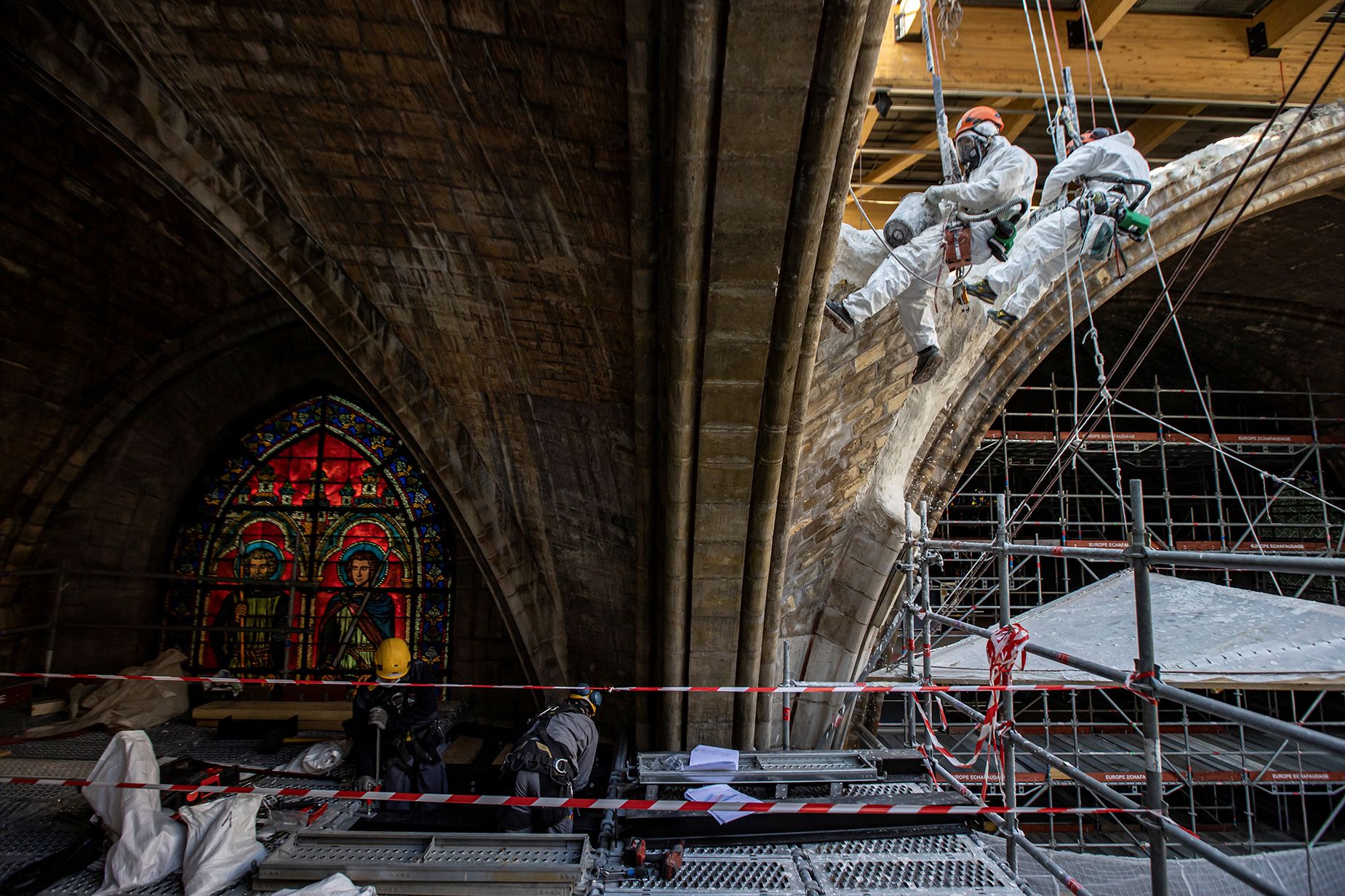
On a recent visit to the construction site, President Emmanuel Macron promised works were “on schedule” for Notre Dame to open to the public on December 8, 2024, five years and seven months after the fire that destroyed large parts of the 860-year-old building in April 2019.
“By the time the Olympic Games come around (in July), we expect to have un-scaffolded the upper part of the spire and completed most of the roofing, so that Parisians and visitors from all over the world can see just how close the cathedral is to reopening,” Philippe Jost of Rebuilding Notre Dame de Paris (the public body responsible for the conservation and restoration of the cathedral), told the French parliament on December 13.
Already, those admiring the gothic structure from the outside are excited by the prospect of being able to re-enter the cathedral.
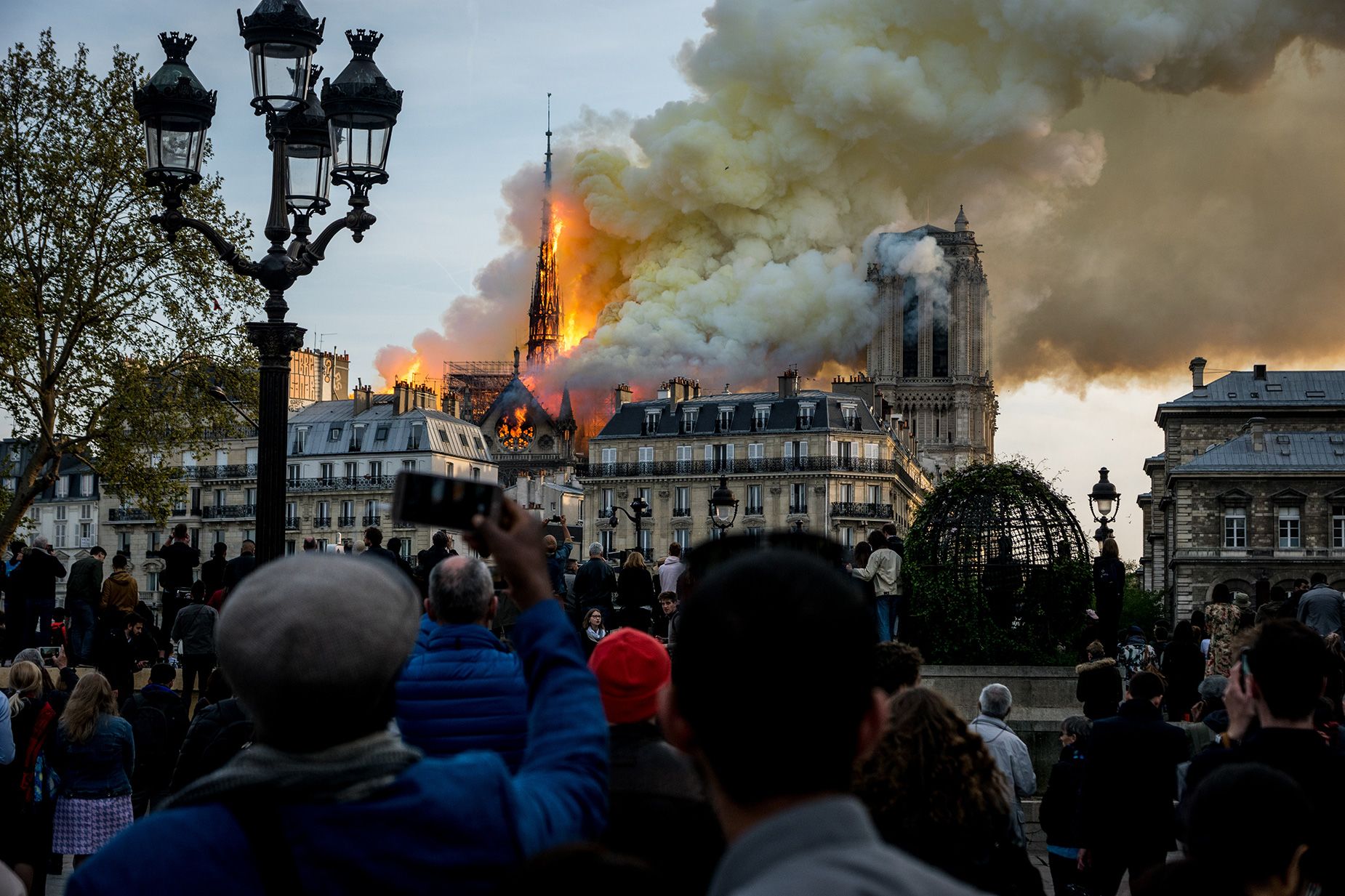
“The first time I came to Paris was 60 years ago, then 40 years ago,” said Stephan’s father, Göran Book, who remembers entering Notre Dame on every one of his previous visits to Paris. “Now I’m 80,” he added. “If I’m still alive next year, I’ll have to come back to see the reopening.”
A monumental effort
According to Rebuilding Notre Dame de Paris, there are nearly 250 companies and art workshops across France tasked with “working on the cathedral’s renaissance.” This includes carpenters, stonemasons, scaffolders, sculptors, gilders, glassmakers and even organ builders, who are restoring the 8,000 pipes and 115 stops of Notre Dame’s great organ, the largest in France.
After the 2019 fire, the first two years of work were devoted to securing the building, completing project studies and awarding tenders. The restoration phase then officially began in September 2021.
In recent months, the most visible advances have been made on the restoration of the framework of the roof, the spire and the large upper galleries.
Alban Dubois, who works as a waiter in Cafe Panis, just across the street from Notre Dame, has been observing the daily progress from the windows of his workplace.
He was there, serving tables, on the day of the infamous fire, and remembers watching in shock as the flames grew larger and the windows of his restaurant became progressively hotter. “People gathered (in the restaurant) and looked on helplessly,” he said. “Some people were crying… It was all very sad.”
Now, Dubois looks forward to the cathedral reopening and predicts lots of people will stop by to pay it a visit. “Even though (Notre Dame) has been here for so many years, it’s going to be a bit like an inauguration,” he said.
According to Jost, 14 million visitors are expected to “flock to see the results of (the) restoration.”
Marking the 21st century
While Notre Dame’s original appearance will be restored, President Macron has also expressed a desire for our century to “have its place among the many others that feature in the works of this cathedral.”
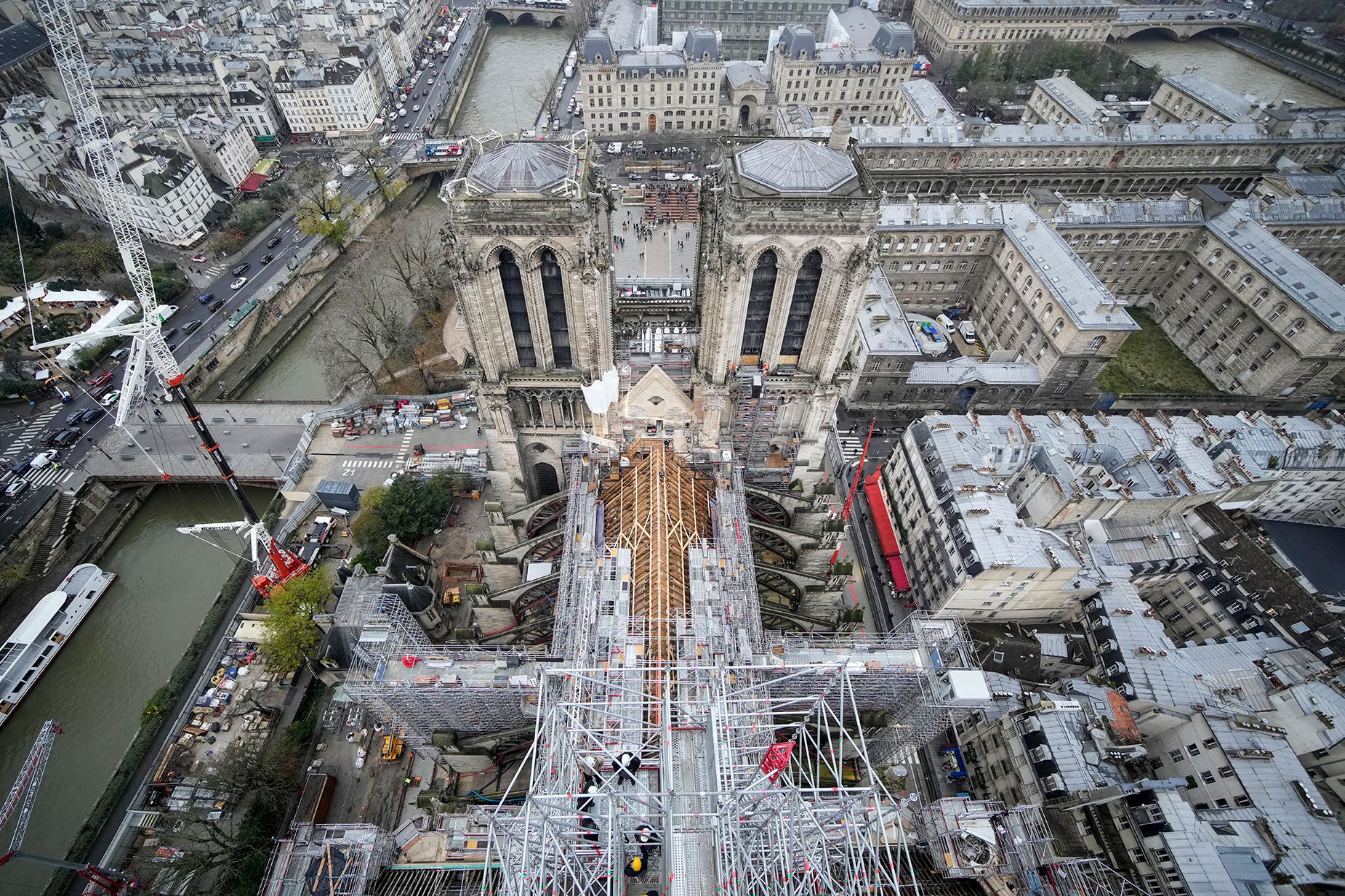
Earlier this month, he announced a competition to allow contemporary artists to recreate six of the stained glass windows on the southern side of Notre Dame, in order to “mark this 21st century.”
In similarly commemorative fashion, the name of the French general who had been overseeing the reconstruction of Notre Dame before his death in a mountain accident earlier this year, was engraved in the wood of the spire. Jean-Louis Georgelin “will remain forever” part of Notre Dame, said Macron, who personally took part in the engraving process on December 8, the day that the cathedral’s oak spire regained its place.
The names of others who took part in the reconstruction of Notre Dame have also been made a permanent fixture of the new cathedral. A sealed tube was placed inside the golden rooster mounted atop the spire on December 16, containing a document listing the 2,000 names of those who have been involved in the works.
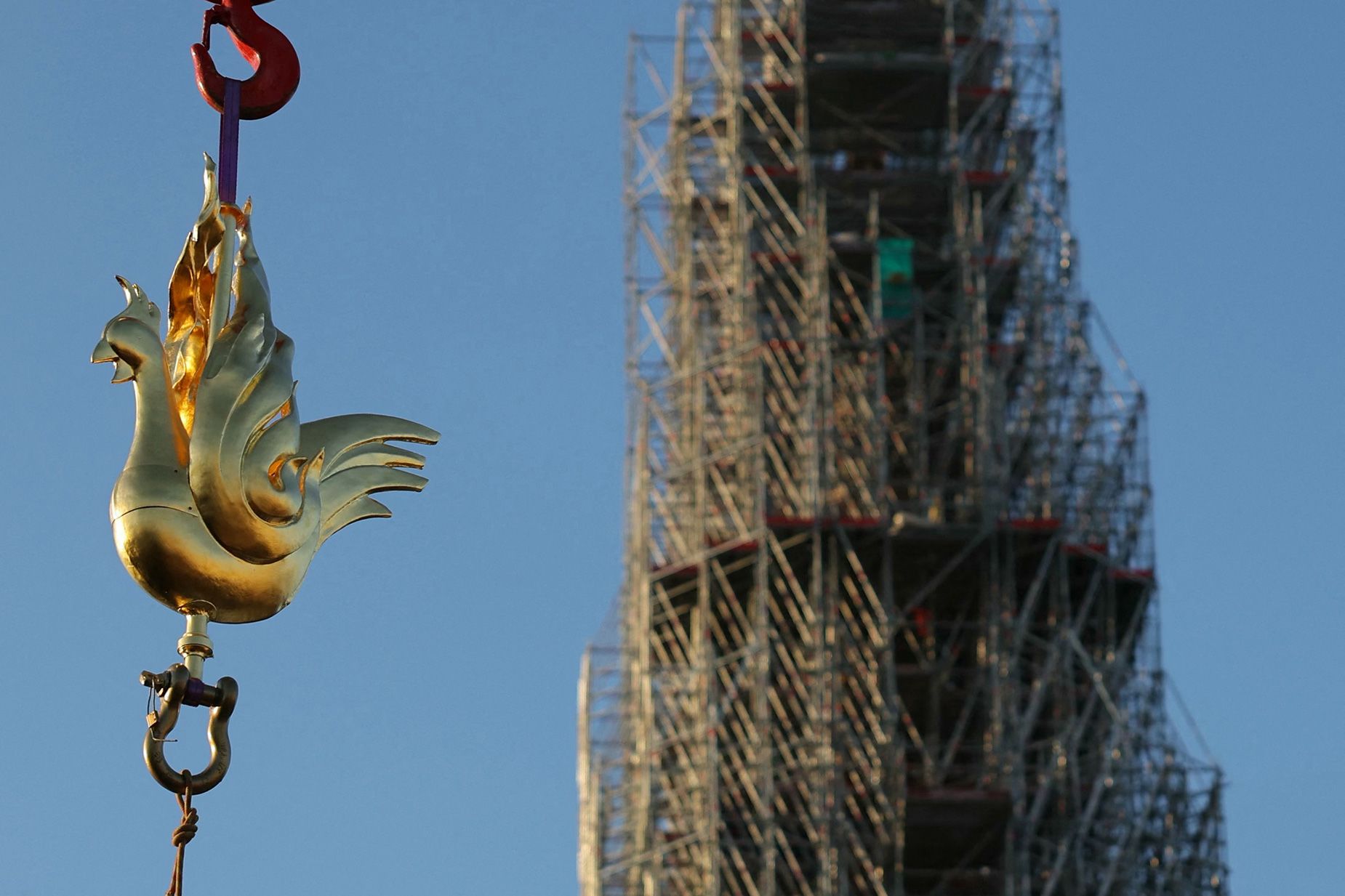
The cathedral spire’s previous rooster had been found, damaged among the rubble, the day after the fire. Inside it were the relics (the mortal remains) of Saint Denis and Saint Geneviève, as well as a fragment of Christ’s crown of thorns, all of which remained intact and have now been placed inside the new rooster, according to the Diocese of Paris.
The old rooster — alongside the six stained glass windows set to be replaced — will be housed in a new museum dedicated to Notre Dame, the opening of which was announced recently by Macron. “It will be a museum of art, a museum of history, a museum to describe the permanent construction site of Notre Dame de Paris,” he said.
The cost of rebuilding Notre Dame is expected to be approximately 700 million euros ($767 million). In total, 846 million euros ($928 million) were raised in donations from 340,000 donors in 150 countries, according to Rebuilding Notre Dame de Paris.
Jost has said that any donated money that isn’t spent on the reconstruction will likely be used to “benefit the cathedral” in other ways.
